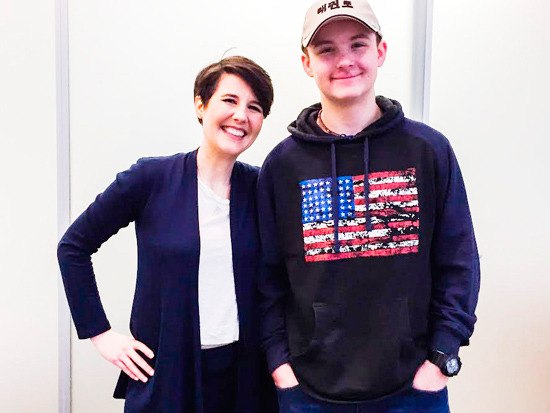Editor’s note: this is the final installment of Tyler Stewart’s journey to coping with migraines with the help of Emily Law, a psychologist at Seattle Children’s Pain Medicine program and a researcher at Seattle Children’s Research Institute. Part 1 was printed in the 3/23 edition of the Courier-Herald.
School and Sports
The breaking point and what Tyler’s mom, Kelly, recalls as his worse migraine was when he had to leave school by ambulance.
She said the teachers and school didn’t really know what to do.
Kelly said Law also helped the family by writing letters to Tahoma to help them better understand what he goes through and to help them understand what he needs to do to help himself and stay in school.
Kelly added the school has been very responsive and has helped engage ideas that will help Tyler succeed.
Through the methods Tyler learned at Seattle Children’s, he has learned that even if he has a headache he needs to go to school.
“She (Law) wants his body at school, even if only for part of the day,” Kelly said.
Already, his sophomore year is an improvement from last year. Not only has he attended more days, his GPA is also up, Kelly said.
“This has been his best semester yet,” she said.
Tyler has been participating in Tae Kwon Do for nine years now.
Kelly said that his time spent doing Tae Kwon Do had already helped him be more active. It allowed him to think “mind over matter.”
She added, this coincides nicely with what Law helped teach Tyler.
For children, Law said the parents initial reaction is to keep them home if they do not feel good.
“It works great with the flu or a short term illness but not chronic headaches,” Law said.
When children stay home from school their muscle become weak and they may get behind in their class work and may even start to lose friends, Law added.
“The goal of cognitive behavioral treatments is to engage in life more even when they don’t feel well,” she said.
This can also help families. Often times conflict can arise in families that include children with migraines, Law said.
His migraines have, however, kept him out of some sports. Tyler said he wasn’t able to play football because of his headaches. And when he was younger, he couldn’t spend as much time outside as he wanted to because he would get migraines too often.
Now when Tyler gets a migraine, he starts with biofeedback. If that doesn’t help, he said he takes medicine early enough to help get rid of the pain. And then he will do something that helps to keep his mind from thinking about the migraine.
Family Connection?
Kelly said five months ago she was diagnosed with migraines.
Ever since, Tyler has been able to help her with coping mechanisms, she said.
This isn’t the first time Kelly said she has had a migraine. When she was 18 years old she got a migraine but this time she had one for nine weeks straight before being diagnosed.
She said there are other family members that also have migraines.
Law said migraines “often travel in families but it is just a correlation.”
She added there is emerging research looking into the genetics behind migraines but right now they do not have a good understanding of the connection.
The Stewart’s goal is to help at least one person by sharing Tyler’s story.
“He’s a good inspiration,” Kelly said.
Will Tyler or Kelly have migraines for the rest of their lives? According to Law it too hard to tell.
She has worked with some patients whose headaches completely go away, with those who have seen a reduction in the number of headaches and she has also seen patients where their headaches never go away.
“(However), from research we have seen that we can reduce the number of headache days and reduce the intensity (to ensure) a better quality of life,” Law said.
Law’s Work
Through Law’s work, she wants all families affected to have access to behavioral solutions and specialized pain care. Having these methods available online would help more families, she said.
“I’m very passionate about it,” she said.
Her goal is to make these treatments available to all children so they do not have to rely solely on medication.
Along with Tonya Palermo, professor of anesthesiology, pediatrics and psychiatry, Law co-authored a self help book for parents with children who suffer from migraines. The book is called “Managing Your Child’s Chronic Pain.”
The book helps teach parents strategies, similar to what Tyler tried, to help alleviate the pain their children are in.
“(The book is just) another avenue to reach out to every family who needs it,” Law said.
Similarly to the book, there is also a blog on Psychology Today by the same name (Managing Your Child’s Chronic Pain). This blog, Law said is, “meant to empower parents with children who have chronic pain.”
According to a blogpost on the Seattle Children’s website, Law has recently received a grant from the National Institutes of Health to support her research.
She said she enjoys working with pediatrics because, “their ways are not set in stone. We can change how they think and feel.”


